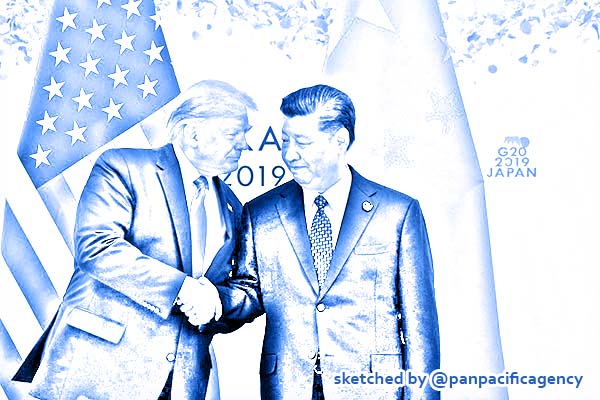Donald Trump says things ‘back on track’ after summit with Xi Jinping

US President Donald Trump says things are back on track after his meeting with Chinese President Xi Jinping in Japan. Photo: Reuters. Sketched by the Pan Pacific Agency.
OSAKA, Jun 29, 2019, SCMP. Chinese President Xi Jinping and his US counterpart Donald Trump have wrapped up their high-stakes summit at the G20 in Osaka, Japan, with Trump saying the outcome was “better than expected”, and China saying the US has agreed not to impose any further tariffs on its goods, reported the South China Morning Post.
The closed-door meeting lasted 80 minutes, 10 minutes less than had been scheduled.
When asked about the talks, Trump said it was a “very, very good meeting, better than expected”.
“We’re right back on track,” he said, without elaborating. The two sides are expected to put out more detailed statements later.
Xinhua, meanwhile, said the two leaders had agreed to resume economic and trade negotiations, and that the US said it would not impose any new tariffs on Chinese products.
The results of the summit, on the sidelines of the G20 leaders’ meeting, will affect not only markets across the world but also the trajectory of global economic growth in the months ahead.
In his opening remarks, Xi cited the “ping-pong diplomacy” that began at the 1971 world table tennis games in Nagoya, Japan, and eventually led to a normalisation of relations between Washington and Beijing.
“China and United States both benefit from cooperation and lose in a confrontation. Cooperation is better than friction, and dialogue is better than confrontation,” he said.
The president said he would exchange views with Trump on some fundamental issues in Sino-US relations.
Trump, meanwhile, said he and Xi “had a lot of time together and became friends”.
“We have an excellent relationship, but we want to do something that will even it up with respect to trade. I think that is something that is actually very easy to do,” he said.
“I actually think that we were very close and then something happened, it slipped a little bit, and now we are getting a little bit closer, but it would be historic if we could do a fair trade deal,” the US president said.
After the opening remarks, neither Trump nor Xi took any questions from journalists.
Accompanying Trump were Secretary of State Mike Pompeo, Trade Representative Robert Lighthizer, Treasury Secretary Steven Mnuchin, White House trade policy adviser Peter Navarro, Commerce Secretary Wilbur Ross, and the national security adviser John Bolton. Ivanka Trump, Trump’s daughter, and Jared Kushner, Trump’s son-in-law, were also at the table. The other two US delegates at the table were Dan Scavino, Trump’s social media director, and Mike Mulvaney, the president’s acting chief of staff.
On the Chinese side were Vice-Premier Liu He, Xi’s chief of staff Ding Xuexiang, top economic planning official He Lifeng, Commerce Minister Zhong Shan, Foreign Minister Wang Yi, Finance Minister Liu Kun, and China’s ambassador in Washington Cui Tiankai. Yang Jiechi, China’s top diplomat, as well as Qin Gang and Zheng Zeguang, both deputy foreign ministers, were also at the table.
Trump said before the talks began that it could be “a very productive meeting”.
“I think we can go on to do something that truly will be monumental and great for both countries, and that’s what I look forward to you,” Trump said.
Meanwhile, China’s state media continued to criticise Washington for blaming China for its trade problems.
People’s Daily, the mouthpiece of the ruling Communist Party of China, published an editorial just hours before the summit arguing that the US should not take its trade deficit as an evidence of “being taken advantage of”, though it did not name Trump directly.
Those who try to blame trade surplus countries for US domestic woes are suffering from a “whole-body smell of selfishness”, the editorial said.
Additional reporting by Kristin Huang, Liu Zhen and Catherine Wong in Osaka